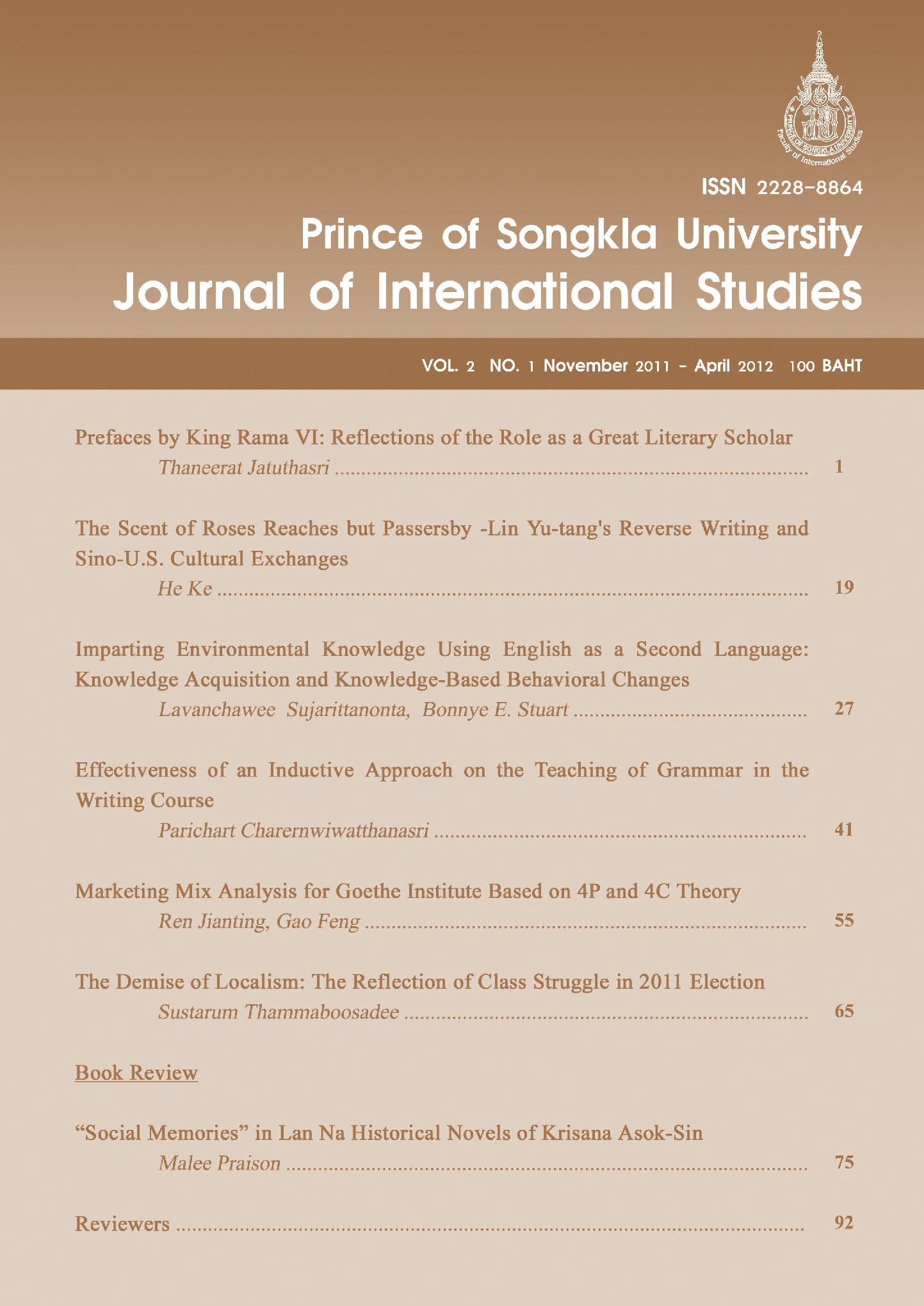The Demise of Localism: The Reflection of Class Struggle in 2011 Election
Main Article Content
Abstract
This article illustrates how the Mondialisation approach of French Marxist Henri Lefebvre can be read as a theory of neoliberal class struggle. Following consideration of Riggsian Bureaucracy and Marxist's structuralism, the article exhibits the insufficiency of latter approaches. It also demonstrates how the perception on local politics is challenged by the general class struggle. The landslide victory of Phua Thai Party does not only confront the national hierarchy status quo but also challenges the power relations in everyday life.
Article Details
Statements and opinions expressed in articles herein are those of the authors and do not necessarily reflect the position of the editors or publisher.
Article, information, text, image, etc. which are published in Journal of International Studies, belong to Journal of International Studies. If anybody or any organization would like to use part or whole of them, they must receive written permission from Journal of International Studies before usage.
References
Brenner, N. (Ed.). (2009). State, space, world: Selected Essasy Henri Lefebvre. London: University of Minnesota Press.
Chaloemtiarana, T. (1979). Thailand: The politics of despotic Paternalism. Bangkok: Thammasat University Press.
Cox, R. (1987). Production, power and world order : social forces in the making of history. New York: Columbia University Press.
Frank, A. G, Chew, S. C., & Denemark, R. A. (1996). The underdevelopment of development : essays in honor of Andre Gunder Frank. Thousand Oaks: Sage Publications.
Glassman, J. (2004). Thailand at the margins: Internationalization of the state and the transformation of labour. Oxford Oxford University Press.
Hanks, L. M. (1972). Rice and man; agricultural ecology in Southeast Asia. Honohulu: University of Hawaii Press.
Jessop, B. (1985). Nicos Poulantzas: Marxist theory and political strategy. New York: St. Martin's Press.
Jessop B. & Lancaster Regionalism, G. (1991). Fordism and poorerasmia formulation. Lancaster: The Group.
Kesboonchoo-Mead, K. (2001). Culture and power in traditional Siamese gover Pacific Affairs, 74(4), 619-620.
Kitirianglarp, K., & Hewison, K. (2009). Social movements and political opposition contemporary Thailand. Pacific Review; 22(4), 451-477.
Laothamathas, A. (1996). Mobile phone mob: bourgeoisie bourgeoisie and businessmen and democratic development. Bangkok: Matichon.
Lefebvre, H. (2002). Everyday life in the modern world. New York: Cintinuum. Murdoch, L. (2011). Yingluck claims victory. Retrieved 1 October 2011, 2011, from http://www.brisbanetimes.com.au/world/yingluck-claims-victory
20110703-1gx81.html
Ouiyanon, P. (2006). The Struggle of Thai Capital. In P. Pasuk (Ed.), Politic, Culture and Survival. . Bangkok: Matichon.
Phongpaichit, P., & Baker, C. (2008). Thaksin's populism. Journal of Contemporary Asia, 38(1), 62-83.
Pijl, K. v. d. (2010). The foreign encounter in myth and religion. London: Pluto.
Pintobtaeng, P. (1998). Politics on the road : 99 days of forum of the poor and history of the demonstrations and protests in the Thai societ. Bangkok: Research and Textbook Production center; Krirk University.
Pongsawat, P. (2006). The Thaksinization of Thailand. Pacific Affairs, 79(1), 143-145. Riggs, F. W. (1966). Thailand; the modernization of a bureaucratic polity. Honolulu: East-West Center Press.
Samudavanija, C.-A. (2002). Thailand: state-building, democracy and globalization. Bangkok: Institute of Public Policy Studies.
Ungpakorn, G. J. (2010). Thailand's crisis and the fight for democracy. London: Thailand's Crisis and the Fight for Democracy.
Walker, A. (2008). The rural constitution and the everyday politics of elections in northern Thailand. Journal of Contemporary Asia 38(1), 84-105,
Webster, D. (2005). Urbanization new drivers, new outcomes. Thailand beyond the crisis. New York: P. G. Warr.
Wongsuphasawat, L. (1997). The extended Bangkok metropolitan region and uneven industrial development in Thailand. In C. J. D. a. D. W. Drakakis-Smith (Ed.), Uneven development in South East Asia (pp. 196-221).
Surray: Ashgate. Wright, E. O. (1997). Class counts, comparative studies in class analysis. Cambridge.
Cambridge University Press.


